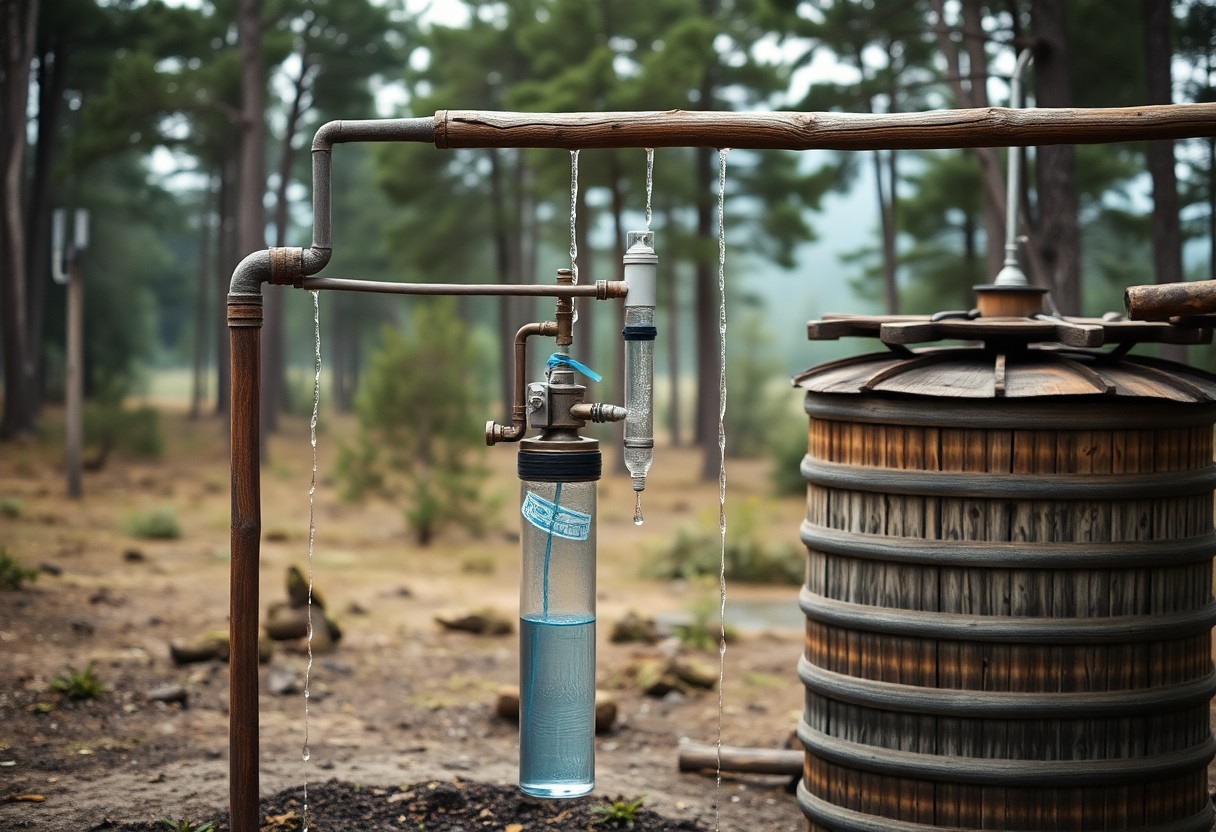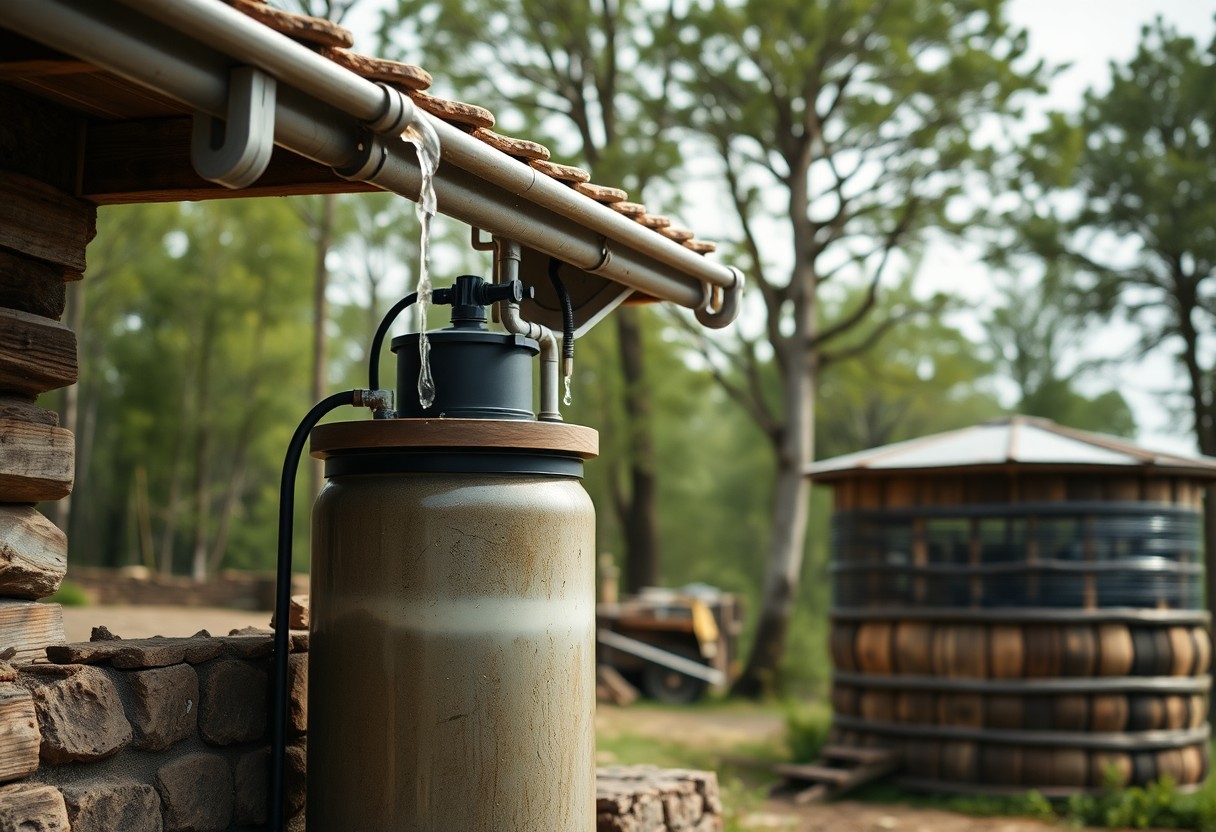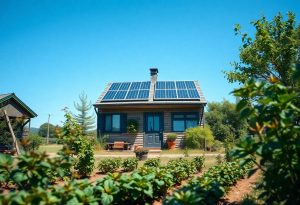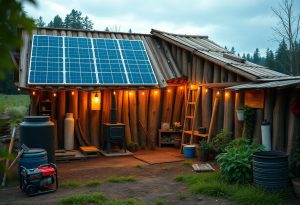Most people underestimate the significance of having a reliable water source when living off-grid. Being proactive in collecting, purifying, and storing water not only enhances your self-sufficiency but also safeguards your health and well-being. This guide will empower you with imperative techniques and valuable insights to ensure that your water supply is clean, safe, and sustainable. Whether you’re just starting your off-grid journey or looking to optimize your existing setup, your ability to manage this vital resource is key to thriving in a self-reliant lifestyle.
Key Takeaways:
- Collection Techniques: Explore various methods for capturing rainwater and other natural sources to ensure a sustainable water supply.
- Filtration Methods: Understand different purification options such as UV, carbon filters, and boiling to make water safe for consumption.
- Storage Solutions: Learn the best practices for storing water, including appropriate containers and optimal conditions to prevent contamination.
- Off-Grid Compatibility: Discover how to implement these water strategies effectively in remote areas without access to traditional infrastructure.
- Environmental Impact: Recognize the importance of eco-friendly practices in water management to promote sustainability and reduce ecological footprints.
Types of Water Collection Methods
For your off-grid water needs, exploring different water collection methods is important. Below are some popular techniques:
| Rainwater Harvesting | Collecting rainfall from roofs and surfaces. |
| Surface Water Collection | Gathering runoff from rivers, lakes, and ponds. |
| Groundwater Extraction | Accessing aquifers and underground water sources. |
| Fog Nets | Catching moisture from fog using mesh nets. |
| Water Barrels | Storing collected rain for future use. |
Thou can now choose the most suitable method for your situation.
Rainwater Harvesting
To maximize your water supply, consider rainwater harvesting. This technique involves collecting water from roofs or other surfaces and funneling it into storage containers. It’s a natural and efficient way to gather a renewable resource.
Surface Water Collection
While many think of rivers and lakes as sources of fresh water, surface water collection can be one of the easiest ways to gather water. By directing runoff and storage from nearby bodies of water, you can supplement your supply.
With surface water collection, be cautious about pollution from agricultural runoff or waste. Always ensure you treat or purify this water before consumption to avoid health risks associated with contaminants.
Groundwater Extraction
Now, consider groundwater extraction as another effective technique. By drilling wells or employing pumps, you can access underground aquifers, providing a reliable and often cleaner source of water.
Rainwater can be an excellent backup, but relying solely on groundwater extraction poses risks like over-extraction leading to depletion of aquifers. Proper management and monitoring are important to maintain water quality and ensure sustainability. Always make certain to test the water for contaminants before use.
Purification Techniques
One effective way to ensure your off-grid water is safe to drink is by employing various purification techniques. These methods can eliminate harmful pathogens, chemicals, and particulates, allowing you to confidently use collected water. By understanding the most effective strategies, like boiling and filtering, chemical treatments, and solar disinfection, you can maintain your health and well-being while living off the grid.
Boiling and Filtering
For immediate purification, boiling your water is highly effective. Heating the water to a rolling boil for at least one minute kills most microorganisms, making it safe for consumption. Additionally, combining this method with filtering can remove larger debris, sediments, and certain contaminants, improving the water’s taste and clarity.
Chemical Treatments
To further ensure your water is safe, consider using chemical treatments. These treatments can effectively neutralize bacteria, viruses, and protozoa that may be present in your water supply.
Chemical treatments typically involve adding chlorine, iodine, or other water purification tablets to your collected water. Follow the manufacturer’s instructions for the correct dosage, and allow the treated water to sit for the recommended time to ensure that harmful microorganisms are effectively neutralized. While these methods are generally effective, be cautious, as some chemicals may impart an unpleasant taste or may not be suitable for long-term use.
Solar Water Disinfection
With solar water disinfection, you harness the sun’s power to purify your water. Placing clear containers of water in direct sunlight for six hours or more can kill pathogens using UV radiation, making the water much safer to drink.
A significant benefit of solar water disinfection is that it relies on natural sunlight, making it energy-efficient and sustainable. However, this method is most effective with clear water, as turbidity reduces UV exposure. Use this method when you have adequate sunlight, and ensure consistency for reliable purification results.
Water Storage Solutions
After you’ve collected and purified your water, proper storage becomes vital to ensure it remains safe and accessible for your off-grid needs. Effective water storage solutions can prevent contamination, evaporation, and waste, allowing you to maximize your resources, and make the most out of every drop.
Tank Systems
To store larger volumes of water, consider tank systems that offer an efficient solution for off-grid living. These systems come in various sizes, materials, and designs to suit your specific needs and can be placed above or underground, providing you with flexibility in installation.
Portable Containers
You can easily gather and transport water with portable containers. These versatile solutions allow you to take water wherever you go, whether for daily use or emergency situations. Invest in durable, lightweight containers that protect your water while making transportation hassle-free.
Portable containers are often designed for easy handling and can include folding water bags, collapsible jerrycans, or rigid canisters. Opt for containers made from food-grade materials to ensure safe drinking water. Additionally, look for containers with proper sealing mechanisms to prevent spills and contamination while you are on the move.
Long-Term Storage Options
Water can be stored long-term through specialized options designed to maintain purity over extended periods. Utilizing food-safe tanks or barrels with secure lids, you can store water effectively without compromising safety, ensuring access when it’s needed most.
Storage techniques for long-term options involve specific practices such as using UV filtration systems or adding purifying agents like iodine tablets prior to sequestering the water. Ensure your containers are kept in cool, dark locations to prevent bacterial growth and maintain water quality for when you need it later.
Step-by-Step Guide to Off-Grid Water Solutions
Many individuals seek sustainable water solutions while living off-grid. This guide breaks down the necessary steps to collect, purify, and store water efficiently. You will find practical options tailored to your needs and available resources.
| Action | Description |
|---|---|
| Collection | Capture rainwater or nearby stream water using appropriate systems. |
| Purification | Utilize filtration and treatment methods to ensure safety. |
| Storage | Use containers that prevent contamination and maintain water quality. |
Planning Your Water System
Solutions begin with assessing your water needs and local resources. Evaluating factors such as climate, terrain, and water source proximity will help you design an effective system tailored to your lifestyle. Taking these details into account will substantially improve efficiency and sustainability.
Implementation and Maintenance
Clearly, once you’ve planned your system, executing it effectively is vital. Regular checks and upkeep of your water collection and purification methods will maximize performance. You should also be aware of any potential contaminants that may affect your water quality.
Understanding how to maintain your off-grid water system ensures ongoing accessibility to safe water. Regularly inspect your filters and purification systems, as neglected components can lead to serious contamination risks. Additionally, develop a schedule for cleaning water storage containers—this will help prevent algae growth and bacteria, creating a more reliable water source. A robust maintenance plan not only supports water quality but also saves you money in the long run by reducing repair costs and improving system efficiency.

Factors to Consider
Now, when planning your off-grid water solution, there are several factors to consider. Take into account:
- Local regulations
- Climate and seasonal variations
- Resource availability
Any oversight in these areas can lead to challenges in collecting, purifying, and storing water effectively.
Local Regulations
Regulations may affect your ability to collect and use water in your area. Before starting your off-grid project, check local laws regarding rainwater harvesting, groundwater extraction, and any necessary permits. Compliance is important to avoid legal complications and ensure a sustainable approach to water management.
Climate and Seasonal Variations
An understanding of climate and seasonal variations in your location will influence your water strategy. Different regions experience varying amounts of precipitation, temperature, and seasonal shifts, ultimately affecting the availability of water resources.
For instance, if you live in a predominantly arid region, you may need to implement extensive water conservation measures or diversify your collection methods to harvest sufficient water during the drier months. Conversely, areas with heavy rainfall could allow for more straightforward collection, but require robust systems to manage potential flooding.
Resource Availability
An assessment of resource availability is vital for effective off-grid water management. Evaluate not just the quantity of water, but also the quality and sustainability of sources you plan to use.
Availability can fluctuate based on seasonal patterns and long-term climatic trends. Sources such as streams, lakes, or rainwater must be monitored for contamination risks and seasonal changes that could affect flow rates. Being aware of these conditions can help you to proactively secure a safe and reliable water supply while planning for potential drought or excess runoff.
Pros and Cons of Off-Grid Water Systems
Unlike conventional water supply systems, off-grid water systems offer unique benefits and challenges. Assessing these factors can help you determine if this lifestyle works for you.
Pros and Cons Breakdown
| Pros | Cons |
|---|---|
| Independence from municipal water supply | High initial setup costs |
| Accessibility in remote locations | Maintenance and upkeep required |
| Potential for self-sustainability | Variable water quality |
| Environmental benefits | Insufficient water supply during droughts |
| Customizable systems | Learning curve for water purification techniques |
Advantages
Systems that harvest and purify water off-grid provide you with the freedom to rely on natural resources. They offer a unique opportunity for self-sustainability and environmental stewardship, allowing you to minimize your ecological footprint by utilizing rainwater and other natural sources.
Disadvantages
Clearly, off-grid water systems come with challenges that require careful consideration. The need for consistent maintenance, proper purification methods, and a reliable water collection strategy means you need to be well-informed and proactive.
Understanding the limitations of off-grid water systems is necessary for your success. For instance, you may face increased costs upfront to set up your system and a steep learning curve regarding maintenance and water safety. In case of extreme weather events, access to a sufficient water supply may prove challenging, particularly during droughts. Evaluating these disadvantages against the potential benefits will help you make an informed decision about your off-grid lifestyle.
Final Words
From above, you’ve gained valuable insights into how to effectively collect, purify, and store water off-grid. By implementing these strategies, you can ensure a sustainable and reliable water supply for your needs, even in the most remote locations. Whether you’re preparing for emergencies or simply embracing a more eco-friendly lifestyle, the knowledge you’ve acquired will empower you to take control of your water resources. Embrace these practices and enhance your self-sufficiency while contributing to a healthier planet.
FAQ
Q: What is “The Eco-Wise Water Guide” about?
A: “The Eco-Wise Water Guide” is a comprehensive resource designed for individuals seeking sustainable methods to collect, purify, and store water while living off-grid. The guide covers various techniques for sourcing water, filtering it for safety, and ensuring proper storage to maintain its quality for personal use.
Q: Who can benefit from this guide?
A: This guide is ideal for a diverse audience, including off-grid enthusiasts, campers, hikers, and those living in remote areas without reliable water sources. It is also valuable for anyone interested in eco-friendly practices, self-sufficiency, and emergency preparedness. The information can aid individuals in making informed decisions regarding their water supply.
Q: What techniques for water purification are discussed in the guide?
A: The guide outlines several effective water purification methods, such as boiling, using solar water disinfection (SODIS), employing filter systems like ceramic filters and activated carbon, and chemical treatments like iodine and chlorine. Each method is explained in detail, highlighting its effectiveness, efficiency, and any required materials.
Q: Is the guide suitable for beginners in off-grid living?
A: Yes, “The Eco-Wise Water Guide” is designed to cater to both beginners and those with more advanced experience in off-grid living. The guide starts with fundamental concepts and gradually researchs into more complex techniques, making it accessible for readers at all levels of knowledge and experience.
Q: Can the information in the guide help during natural disasters or emergencies?
A: Absolutely! The guide provides imperative information for sourcing and purifying water in emergency situations, such as during natural disasters when regular water supply systems may be compromised. It emphasizes practical, easily implemented methods that people can use to ensure access to safe drinking water when conventional sources are unavailable.




